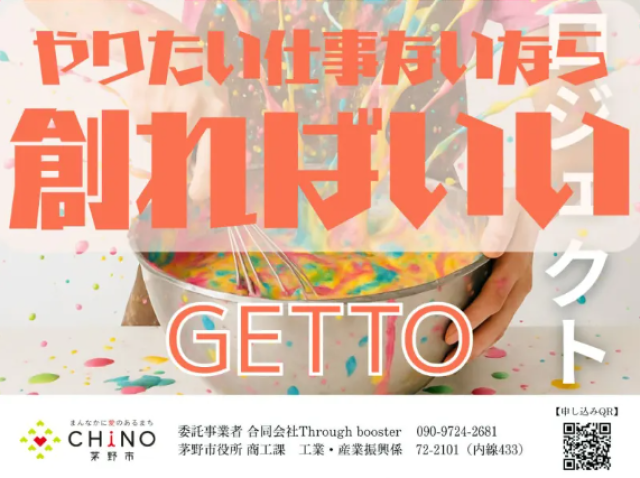
Come on, ladies! This GETTO is for you!
A lot of fun has been poked at Japan in the past for its inaccurate translations, but these days, it doesn’t seem to occur nearly as much. Perhaps the importance of skilled translators is being appreciated, or improvements in technology have been adopted, but I now occasionally find myself impressed with some of the English choices Japanese companies make.
Still, English is a vast language; so vast that I’m going to invent the word “chasmatic” just to describe it, thus making it even more vast. It’s such that even the most well-thought-out names or slogans can still accidentally elicit unwanted connotations.
For example, the city of Chino in Nagano Prefecture recently unveiled a support program for female entrepreneurs. The concept of the name was cleverly based on two meanings for the phrasal verb “get to,” which are to begin something, as in “get to work,” or to arrive at a destination, as in “get to work,” or a less confusing context.
Where they ran into trouble was taking the phrase “get to” and cramming the words together to make “GETTO.” Not only would English speakers read that as a homonym of “ghetto,” but the organizers seemed to understand this too and also changed the pronunciation to officially be like “ghetto” (ゲットー).

To make matters worse, “getto” is the Polish spelling of “ghetto,” distancing it from the somewhat redeemably soulful sense used by Crystal Waters and Geto Boys, and landing it squarely in Holocaust territory. One entrepreneur told media, “It reminds me of the history of discrimination against Jewish people, and makes me uneasy. It sounds like the opposite of diversity, so it’s hard to join.”
Shortly after the announcement, people were quick to point all this out to Chino city officials. Initially, they reportedly decided to keep the spelling, but instead changed the official pronunciation to “get to” (ゲット・トゥー). However, on 24 September, the city removed all promotional material with “GETTO” but will otherwise continue to run the project as is.
Some readers of the news online felt this was a case of people being oversensitive, but most chalked it up to another case of not checking for deeper meanings of seemingly innocent words.
“This is just nitpicking. Do we need to scrutinize everything?”
“The first thing I thought of was the Jewish people.”
“The company that thought this up is weird, but the city is weirder for approving it.”
“If you search ‘getto’ online, the first result is the place where Jewish people were segregated.”
“I’m sure there was no ill intent, but it was the first thing that crossed my mind, too.”
“Pokémon getto!”
“It’s totally unrelated, so they should just be proud of it. Do Americans avoid saying ‘get to?’ No, they don’t.”
“Research is important.”
To be fair, even native English speakers aren’t immune to these kinds of mix-ups. So it always pays to get your company or brand names vetted by a trained professional. In fact, I happen to provide such a service with my professional content proofreading service, PCP for You. Many of my prospective clients are in law enforcement.
Sources: NEWSjp, Hachima Kiko, Chino City
Images: Chino City
● Want to hear about SoraNews24’s latest articles as soon as they’re published? Follow us on Facebook and Twitter!
Like this:
Like Loading…


AloJapan.com